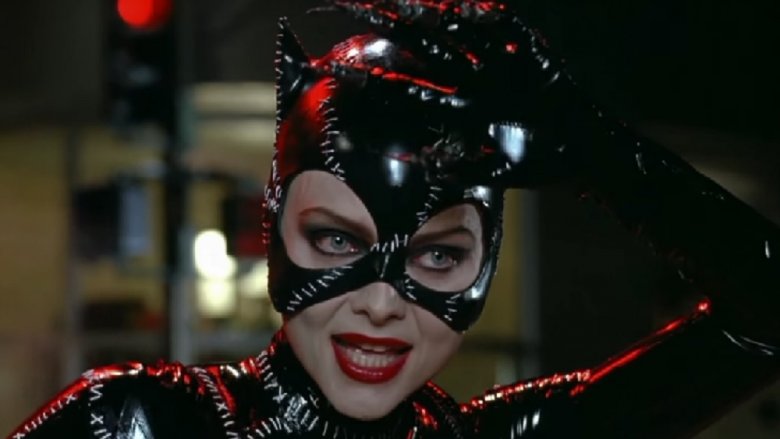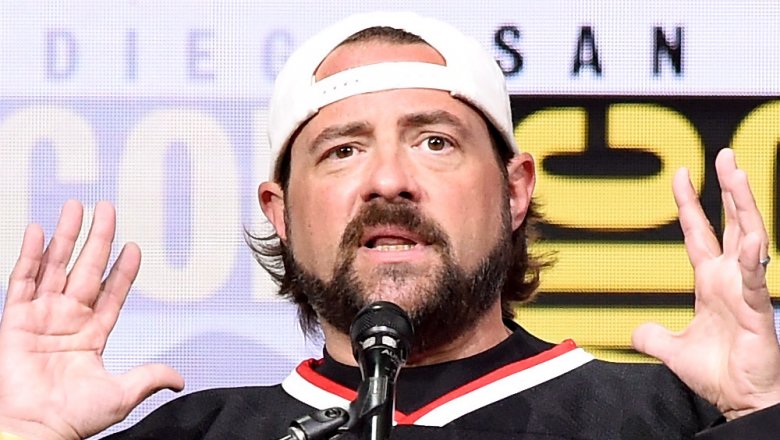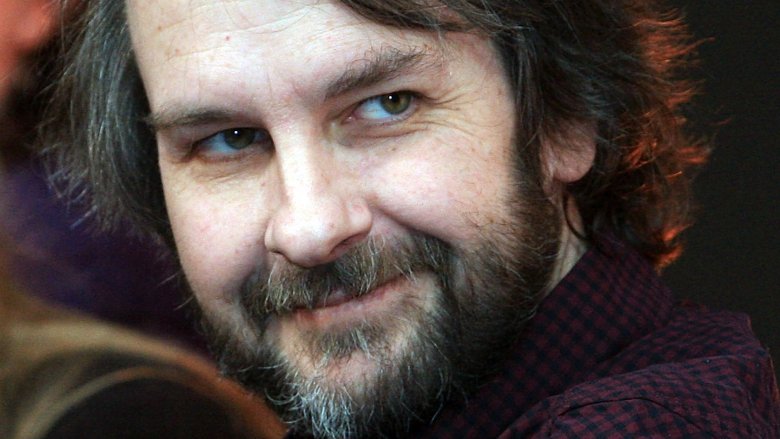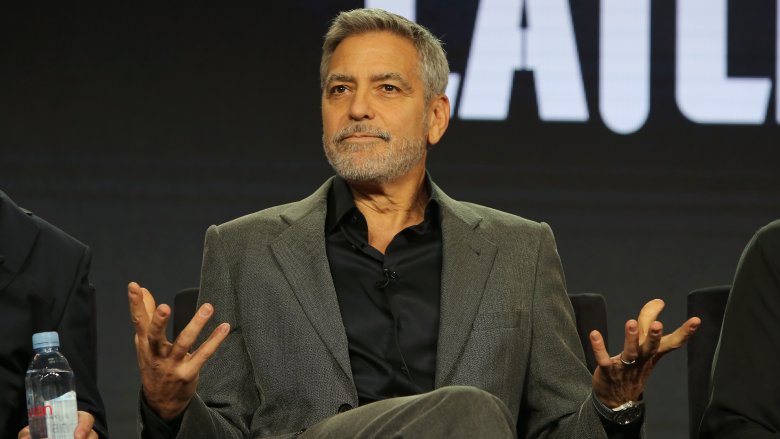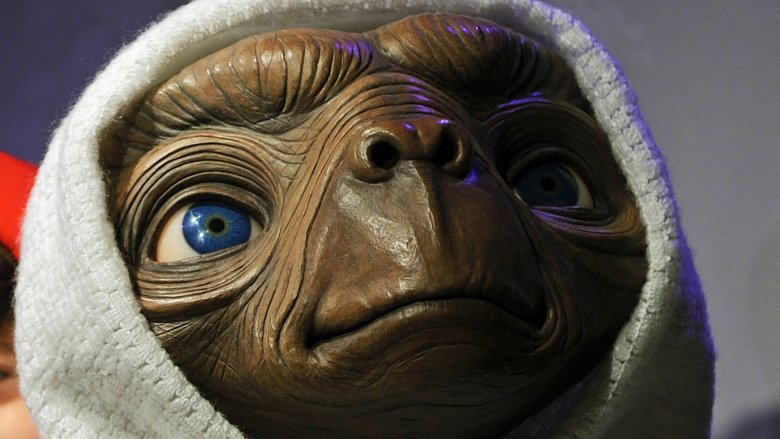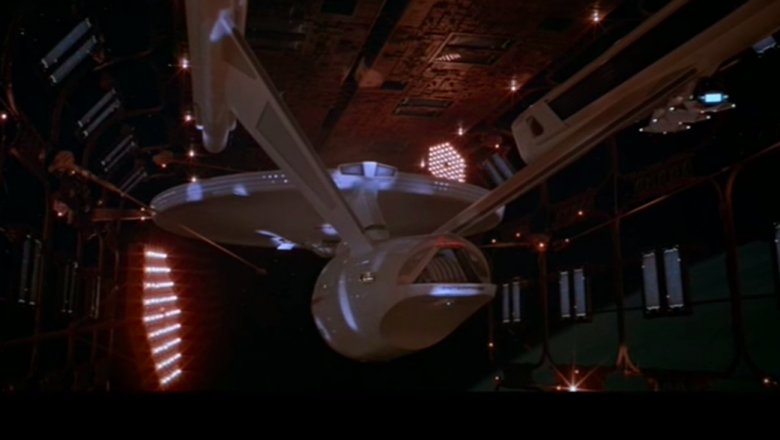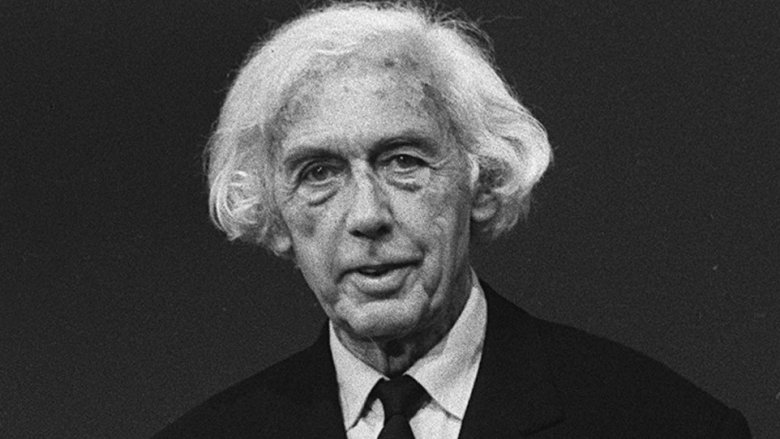Bizarre Reasons These Movies Were Canceled
This might surprise you, but Hollywood isn't perfect. Terrible ideas can get the green light for the silliest of reasons, and promising projects can gain momentum only to fall apart, leaving disappointed fans wondering why Tinseltown would tease us so. Oftentimes, there are perfectly good reasons for the cancellation of an in-development project — the death of a lead actor, for example, or a blindingly fast exit by a director. But some exciting projects were canned for reasons that are nonsensical, bizarre, stupid, or all three.
Tim Burton's 'Catwoman'
Most fans agree that Michelle Pfeiffer's turn as Catwoman was the best, slinkiest thing about 1992's Batman Returns, Tim Burton's uneven followup to his genre-redefining Batman. Although Burton has since made a strong case for why he shouldn't have been allowed anywhere near these movies — famously stating that he's never read a comic book in his life — fans appreciated the visual flair and rare lack of Johnny Depp that Burton brought to the series, and Pfeiffer's portrayal has become the standard in a veritable sea of live-action Catwomen over the years. Few moviegoers realize, however, that we almost got more of it in the form of a standalone Catwoman feature that, according to Den of Geek, would have starred Pfeiffer and might have been directed by Burton.
It was Batman Forever, the 1995 sequel to Returns, that killed the idea for good. In 1993, Variety reported that Catwoman was conspicuously absent from Forever specifically so she could be spun off into her own film. However, as Den of Geek noted, Returns screenwriter Daniel Waters delivered his script for Catwoman on the very day that Forever hit theaters and became the highest-grossing film of the year while sporting a noticeably lighter tone than the previous two films. Warner Brothers decided that dark 'n' gritty just wasn't the way of the future and scrapped Catwoman, which eventually morphed into the light, goofy, and supremely terrible 2004 Halle Berry vehicle of the same name. Having learned its lesson, WB then swung super-hard in the dark 'n' gritty direction and never stopped.
Tim Burton and Kevin Smith's 'Superman Lives'
After the original Superman franchise perished in a ball of nuclear fire, executives were in a quandary as to how best to rekindle the Man of Steel's cinematic mojo. According to PopCultist, legendarily idiotic producer Jon Peters had harassed a couple of drafts of a script entitled Superman Reborn from two different minor league screenwriters, the second of which was actually welcomed by Warner execs ... until it fell into the hands of Kevin Smith, then just a schlubby weirdo with three features to his name. (Now he's a schlubby weirdo with a lot more features to his name.) Since Smith was a lifelong comics fan, he tried not to vomit all over the script while explaining how hard it sucked, so Peters challenged him to do better. Smith did way, way better.
Den of Geek reported that Smith turned in a script (titled Superman Lives) that reads a whole lot like today's Marvel blockbusters — chock full of humor, Easter eggs, and kickass action — while adhering to Peters' mandates: no stupid suit and no flying. Oh, and Superman had to fight a giant spider in the end. After a second draft that probably included Superman opening a quiche stand for some reason, none other than Tim Burton came on board to direct — at which point Peters promptly trashed Smith's script. After several more rewrites, Burton got bored, Peters got his giant spider (plugged into the end of the Will Smith vehicle Wild Wild West), and Superman Lives died.
'Hellraiser: Origins'
Clive Barker's masterpiece Hellraiser launched a franchise that, more so than perhaps any other, has just gotten crappier and crappier with each entry. After 2011's Hellraiser: Revelations delivered the final insult by replacing beloved Pinhead actor Doug Bradley, fans had little reason to be excited about the future of the series—until this screaming nightmare of a teaser trailer showed up on YouTube in late 2013 and blew everybody's hair back.
The trailer was created "to aid in pitching to reboot the Hellraiser franchise" by director Mike Le Han and and artist Paul Gerrard, and can accurately be described as "shorts-befoulingly scary", which notably has not applied to a Hellraiser film since 1987. Fans were super-excited—until Barker himself chimed in on his Facebook to say that he, too was working on a rebooted Hellraiser project, making no mention of the stunningly awesome trailer and insane concept art making the rounds. The proclamation seemed to bury Le Han and Gerrard's pitch before it could properly be pitched to anyone, but at least fans could take solace that Barker was finally returning to right the ship—except that never happened, either. Instead, they're getting another direct-to-video jank-fest written and directed by a longtime makeup effects artist, which is totally what they wanted all along.
'10 Things I Hate About Life'
A teen-centric adaptation of a Shakespeare property starring Heath Ledger sounds like a succinct summary of the entire late '90s, making 10 Things I Hate About You possibly the late '90s-iest film of all time. It was also quite good, helping to bolster the movie star credentials of Ledger and Joseph Gordon-Levitt and earning its place in the hearts of viewers with its wry humor and soundtrack featuring ultra-'90s covers. According to Den of Geek, in 2012, at pretty much precisely the moment the film's target audience started to become capable of nostalgia, belated sequel 10 Things I Hate About Life went into production and then vanished faster than your old Letters to Cleo CDs.
After several weeks of filming in late 2012, production halted for reasons that are completely unclear, and just never started again. A lawsuit filed by the film's production company accused star Evan Rachel Wood of simply changing her mind about finishing the film during the break in production, while Wood insisted that this was bull pies and that the producers had run out of money and needed a scapegoat. Much like the film's production, the litigation seems to have simply petered out, and 10 Things fans were left in the lurch with nothing but a trailer that probably doesn't even reveal one half of one of the things.
Peter Jackson's 'Halo'
Of all the hotly anticipated films to disappear into the ether, the live-action adaptation of Microsoft's monster Halo video game franchise probably seemed like the surest bet to actually happen. It certainly seemed like a sure thing to Microsoft — such a sure thing, in fact, that, according to Wired, the software company fumbled its first major Hollywood deal harder than Ricky Williams after a blunt and a greasy hoagie.
After shelling out $1 million for the script in 2005 and attaching the red-hot Peter Jackson as producer (and some then-unknown kid named Neill Blomkamp as director), Microsoft mounted the most ill-advised pitch they possibly could have, delivering copies of the script to unimpressed studio execs via hired actors in Master Chief costumes. Microsoft's terms: full creative control, as big a budget as they wanted, the Moon, Sun and stars — and interested parties had 24 hours to decide.
Nearly every studio passed immediately, with Fox and Universal agreeing to partner up. But more problems ensued: Microsoft's continuing inability to speak Hollywood-ese frustrated executives, and studio head Tom Rothman hated Blomkamp (who says he will never work with Fox again "unless they pay me an ungodly amount of money and I have absolute f–king control"). After several months and millions of dollars in pre-production, Universal demanded that the producers make budget cuts. The producers said no, and Halo bit the dust. Said one involved party, "Microsoft's unwillingness to reduce their deal killed (it). ... It got too top-heavy. That movie could have been Avatar."
Paul Verhoeven's 'Crusade'
Dutch director Paul Verhoeven is responsible for RoboCop and Starship Troopers, which is to say that he's one of the greatest filmmakers of our time. He's fond of slipping hardcore social commentary into crazy science fiction B-movies, knows his way around an action sequence, and loves to provoke — all of which make his lost epic Crusade one of the more disappointing canceled projects ever.
True to Verhoeven's existing body of work, the film — which was in development in the early '90s — would have courted controversy, as in his view, "the story of the Crusades is the murderous attack of the Christians on the Arabs and the Jews," according to One Room With A View. It reportedly would have starred an in-his-prime Arnold Schwarzenegger, a dream pairing of director and star if there ever was one, with Jennifer Connelly and Gary Sinise also attached. Oh, and it was budgeted at a cool $100 million — a ridiculous amount at the time, and which ultimately sunk the project when Verhoeven wouldn't promise producers that he'd honor it. When they reasonably asked for a guarantee that $100 million wouldn't turn into $130 million or more, Verhoeven promptly ripped their heads off, supposedly ranting about the lack of guarantees in life while Arnold freaking Schwarzenegger kicked him under the table trying to shut him up. "But he just wouldn't," Arnie told Empire, "and that was it. That was the end of that movie." Instead, studio Carolco decided to dump the funds into the 1995 pirate epic Cutthroat Island, which famously sucked and basically killed the studio.
'Popeye'
Popeye was a beloved cartoon that taught generations of youngsters the questionable lesson that one serving of spinach will enable you to literally beat the crap out of anybody. In 2012, Sony Pictures Animation announced that veteran Russian-American animator Genndy Tartakovsky had blown Sony's socks off with his pitch for an updated, 3-D CGI take on the classic character. Fans were soon treated to a promising sizzle reel, but this is a division of Sony Pictures, which only makes a good decision about once every ten years.
The studio inexplicably decided to can the guy who had just delivered their biggest animated success to date (Hotel Transylvania) from the project that was his idea in the first place. Tartakovsky shuffled off to work on Hotel Transylvania 2, and Sony was oddly unable to find any other directors willing to take up the helm of some other guy's passion project. Instead, they got T.J. Fixman, the guy responsible for the awful Ratchet and Clank movie, to write his own version, according to Deadline. Unsurprisingly, hopes are not high.
John Lasseter's 'Where the Wild Things Are'
Today, John Lasseter is the Big Enchilada at not only Pixar, but all of Walt Disney Animation Studios. But in 1983, he was just an up-and-coming animator at slumping Disney. Animated flops and ill-advised forays into live action had left the studio struggling, but Lasseter was convinced he was on to the wave of the future. He came to executives with a 30-second test animation based on Maurice Sendak's beloved children's book Where the Wild Things Are, which blended hand-drawn and computer-generated imagery in a way nobody had done yet.
Of course, he totally was on to the wave of the future, but Den of Geek reports that Disney executives at the time weren't really into any new process that didn't make animation faster or cheaper. They would eventually come around, incorporating CGI elements into "renaissance" classics like Beauty and the Beast, but they could and probably should have cashed in on Lasseter's sorcery a good decade sooner. Instead, they were content to produce future classics like Toy Story while waiting for him to build Pixar into the most trusted brand in CGI animated features, before purchasing it in 2006 for over $7 billion — the initial stage of their master plan to Mouse-ify every successful property on Earth.
Tim Minchin's 'Larrikins'
Aussie comedian Tim Minchin is ridiculously talented, hilarious, and creative. If it seems like you haven't heard much from him in recent years, there's a reason for that: his life has been consumed with a passion project of his own. Minchin is just as adept musically as he is super-funny, so fans were excited when Dreamworks announced in 2013 that it had picked up an animated musical, Larrikins, which Minchin would write and co-direct. It would be the story of a young kangaroo exploring the outback, discovering life-changing kangaroo secrets, and presumably singing funny songs. As development continued, reports trickled in of a stellar cast taking shape — Hugh Jackman, Margot Robbie, Naomi Watts, and Rose Byrne had all signed on. With such amazingly talented and creative people on board, it was hard to see what could go wrong. By this point in the article, you can probably guess what happened.
Dreamworks pulled the plug on this awesomely unique production stuffed to the gills with amazing talent because, according to Deadline, "creatively it just wasn't working out well," which sounds suspiciously like code for "screw Tim Minchin." Minchin bummed fans out further with his reaction to the axing of the project he'd poured four years into by promising to get publicly drunk and sing unfunny ballads. Whatever, Tim.
Guillermo Del Toro's 'At the Mountains of Madness'
Perhaps no author has proved more unadaptable than H.P. Lovecraft, the genius who gave us Cthulhu and the most awesome parts of Stephen King. But if anybody was qualified to bring one of the pioneering author's most seminal works to the screen, it would be Guillermo Del Toro. That makes the demise of At the Mountains of Madness all the more maddening.
Despite the challenging nature of the material, Del Toro was ready to let cinematic deity James Cameron produce and Tom Cruise star in order to get a proper adaptation of the venerated author's most revered work on film, only for the project to fall apart over one point of contention: the rating. While not blinking at the proposed $150 million budget, Universal simply couldn't abide an R rating for one of the most horrifying stories ever told. As Del Toro told Collider: "We thought we had a very good, safe package. ... The R was what made it. If Mountains had been PG-13, or I had said PG-13 ... I'm too much of a Boy Scout. I should have lied, but I didn't."
Next time, Guillermo Del Toro, just lie through your teeth until your awesome movie gets made.
The comic book that scared George Clooney into backing out of the movie
Before Samuel L. Jackson became the very Samuel L. Jackson-y version of Nick Fury that we all know today, George Clooney was in talks to star in a Nick Fury movie. Now, today it's really hard to imagine anyone but Jackson as Nick Fury, but Clooney did sort of kind of fit with that older version of Nick Fury from the comics (the one where he was a white dude). According to Business Insider, though, at some point Clooney picked up an issue from the 2001-2002 Nick Fury comic series, written by Garth Ennis, and was forever put off the idea of playing Nick Fury. In the comic, Fury dispatches an enemy in a rather unconventional way — by strangling him with his own intestines, which ewww.
That was enough to derail everyone's movie aspirations — Clooney thought the gratuitously violent comics might translate into a gratuitously violent film and he evidently didn't think that was a smart career move. In retrospect, though, we so far haven't seen Samuel L. Jackson strangle anyone with their own intestines, so Clooney's decision might have been a little hasty, especially considering the fact that most Marvel movies, with only a couple of exceptions, have been pretty solidly PG-13.
The movie that was canceled because Steven Spielberg was a know-nothing director
It's hard to imagine, but there was a time when the great Steven Spielberg didn't know much about making movies. Way, way back in 1967, toward the start of Spielberg's career, he worked on a short film named Slipstream, which Empire called "a tale about adrenaline junkie bicycle racers ... designed as an exercise in directorial showmanship."
Spielberg worked on the film over the course of a few weekends but then ran out of money. That's because he figured on being able to make the film for around $5,000, which frankly sounds insane even in 1967 dollars. Granted, Slipstream was supposed to be a short film, but in the mid-1960s the average feature-length movie was 127 minutes long and cost around $1.5 million, so $5,000 for a short film seems a little optimistic, given that in those days the average movie cost about $12,000 a minute.
That's not to say nothing good came out of the experience. Without Slipstream, ET The Extra-Terrestrial, Empire of the Sun, and The Color Purple might also never have been made (or at the very least would have been very different films). Spielberg was introduced to cinematographer Allen Daviau, who worked on all three of those future projects, while searching for a Slipstream cameraman.
The movie that was canceled maybe because the LAPD wanted it that way, maybe
City of Lies, a thriller about the murders of Tupac Shakur and The Notorious B.I.G., has an especially unusual cancellation story. Filming had already wrapped up when producers decided to pull the plug.
Now, when you think about the money that's spent on a big Hollywood blockbuster (in this case, around $50 million), it seems insane to think that the people involved might see it all the way through to the end of filming and only then decide that it's not worth taking to the big screen. So what happened to City of Lies?
Well, conspiracy theories abound. According to Mandatory, the original release date of May 2018 was pushed back to September 2018, and then it was postponed indefinitely (which is really just another way of saying it was canceled.) There were rumors that the cancellation had something to do with Johnny Depp being, well, Johnny Depp, but there were more sinister rumors, too. Director Brad Furman says he received multiple warnings from "parties close to the case" that the LAPD was maybe not cool with him telling that particular story. One person even advised him to "get a burner" phone and cover his webcam in case someone tried to frame him.
To date, City of Lies still doesn't have a U.S. release date and hasn't gone to DVD/Blu-ray, although it appears to have had a limited release in Italy, where the LAPD evidently has no clout.
The movie that was canceled because thank god this movie was canceled
If you are one of the many '80s kids who has fond memories of watching E.T. on the big screen, you've probably wondered at some point why they never made a sequel. Surely that heartwarming tale of a boy's friendship with something that looks like a reduced-calorie Cinnabon attached via selfie-stick to the taxidermied body of a rare hairless dwarf gorilla that's been languishing for decades at the Museum of Natural History would have inspired at least a follow-up movie or two.
As it turns out, there actually was a sequel to E.T. in the works, and thank all the lords of Hollywood and everything that is good in the universe that it was never actually made because it would have shattered the innocence of every one of those '80s kids.
The movie was called Nocturnal Fears, and the plot was so ridiculous that one wonders whether Steven Spielberg was temporarily replaced by an actual alien when he was planning this freakshow of a movie. According to SyFy, the story included such suspenseful plot points as children being tortured and interrogated and cattle being mutilated, because what's more creative than an alien movie in which humans are probed and cattle are mutilated?
Thankfully, at some point Spielberg came to his senses and declared that a sequel to E.T. would have accomplished nothing except for "rob[bing] the original of its virginity." Crisis averted.
The movie that wasn't made because the director had a temper tantrum
You'll be shocked to hear that some movies don't get made because Hollywood egos get in the way. It's true! And it's not always the actors who suffer from ego-ginormity. Directors do, too, and sometimes the people who are providing the money are like, "Um, nope. We're not going to make a movie with your giant ego."
According to Empire, that's exactly what happened with Paul Verhoeven's Crusade, an epic story of violence, racism, and anti-Semitism, which some people described as "part Spartacus, part Conan." Crusade was going to star Arnold Schwarzenegger, everyone's favorite governor and manly-man, and it was far enough along that the sets had already been built (in Spain, no less) and the actors had already signed.
Then in the final studio meeting, someone had the audacity to ask Verhoeven if he could guarantee that the film's expenditures wouldn't exceed $100 million and he proceeded to lose his mind. Schwarzenegger told Empire that Verhoeven flew into a rant about how "guarantees don't happen," which included some nonsensical stuff about getting hit by a truck and not believing in God. Schwarzenegger said he kept kicking the director under his chair to get him to shut up, "But he just wouldn't, and that was it. That was the end of that movie."
The movie that wasn't made because there's no future in science fiction
Before Star Wars, there was Star Trek. Star Trek did green-screened space ships, dudes in rubber alien suits, and annoying furry creatures a full decade before Star Wars did it, and yet for some reason Star Wars got all the cool action figures and overpriced Lego sets.
And that contentious relationship goes back a really long way. In fact, Star Wars might have been the final rivet in the Star Trek movie trilogy's whatever-the-equivalent-of-a-space-odyssey-coffin-is.
According to Den of Geek, the original Star Trek movie had a long history of plot ideas, which included everything from a machine hurtling through space pretending to be God to some weird vengeful sentient snake thingy to a black hole and some Mayans. The writers finally settled on a story called Planet of the Titans, which would have had the Greek Titans living on the edge of a black hole, and evidently they also planned to throw in some stuff about Spock and sexuality, which are two words that do not belong in the same sentence. But even after they settled on a story, the movie was plagued by casting difficulties, creative disagreements, and finally, a lack of vision about what fans might want. But ultimately, it was all the negative pre-release buzz about Star Wars and the fact that Paramount Chairman Barry Diller may or may not have said, "There's no future in science fiction."
The movie that was canceled because the director thought animals would be less temperamental than overpaid actors
Genesis was Robert Bresson's dream project — a huge, sweeping epic tale of Biblical hijinks and cute, furry animals. But the idea never really got very far. According to The Films of Robert Bresson: A Casebook, Bresson worked on a Genesis script in 1963, but at that point the project was abandoned due to "clashing artistic sensibilities." He didn't give up on the idea, though, and had hopes of continuing after the 1983 release of his film L'Argent, but a poor box-office performance and less-than-stellar reviews from both critics and audiences meant he wasn't able to raise the kind of money one would obviously need to raise to create a sweeping epic tale of Biblical hijinks and cute, furry animals.
Those weren't the only factors standing between Bresson and the realization of his dream project, though. Evidently, he also wasn't expecting that it would be so hard to work with all those cute, furry animals. Bresson once said that unlike human actors, the animals refused to do as they were told. Um, we're sure he also had professional animal trainers helping him out, but that does kind of make you think that he just went into some zoo at night with a bunch of cameras and then was shocked because the tigers were chasing around the key grip and the chimpanzees were throwing their poop at everyone.
The movie that was literally canceled because of floods and military aircraft
It seems like God or nature or the ghost of Miguel de Cervantes just do not want some films to ever see the light of day, and at a certain point you have to wonder why the directors keep taking all the years of abuse just to realize a project that really does not want to be realized.
Terry Gilliam's The Man who Killed Don Quixote began production in 1997 and got canceled after a series of really strange, curse-like misfortunes. According to the Wrap, a flood wiped out a bunch of equipment on the second day of shooting. Also, footage had to be scrapped because someone evidently thought it would be a good idea to film near a Spanish air base, and the Spanish military had the audacity to keep flying fighter planes over the set. And then there was the part where Johnny Depp was a time-traveling ad executive. We're not exactly sure how that figured into the movie's cancellation, but there's no way such a stupid idea didn't play at least a small role.
Unlike the other films on this list, The Man Who Killed Don Quixote was eventually resurrected, though it took nearly two decades. The version that will finally reach theaters features Adam Driver as a time-traveling ad executive, which really does not seem much better than Johnny Depp as a time-traveling ad executive, but perhaps we'll all be pleasantly surprised?
